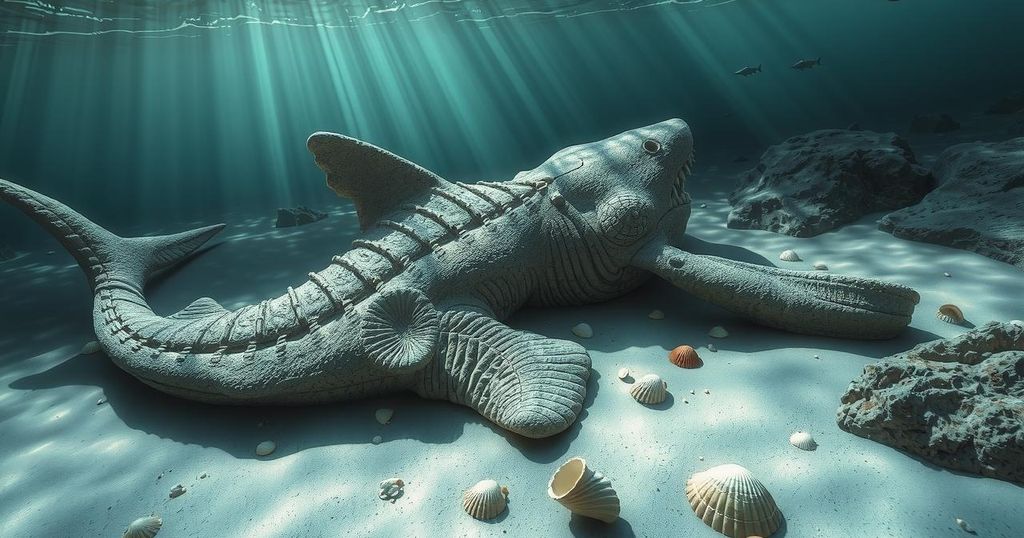Researchers in Peru have unveiled a nearly complete 9-million-year-old shark fossil, believed to be an ancestor of the great white shark. Found in the Pisco basin, the fossil showcases exceptional preservation, with large teeth and evidence of sardines in the stomach. This discovery enhances our understanding of prehistoric marine life and indicates the shark’s ecological role as a predator.
In a remarkable paleontological discovery, researchers in Peru unveiled the fossilized remains of an ancient shark, believed to be a relative of the modern great white shark, dating back nine million years. Found approximately 235 kilometers south of Lima in the Pisco basin, this nearly-complete specimen, known as Cosmopolitodus Hastalis, showcases excellent fossilization and provides crucial insights into ancient marine life. The shark, which could measure nearly seven meters, primarily subsisted on sardines, as evidenced by numerous sardine remains found within its stomach, indicating its ecological role in the ancient food web.
Presented in glass urns, one of which displayed the shark’s formidable jaw with sharp teeth, the remains are significant due to their almost complete state, which is rare among shark fossils globally. Cesar Augusto Chacaltana, an engineer at the Peruvian geological and mining institute (INGEMMET), remarked on the exceptional preservation of the specimen. Paleontologist Mario Urbina emphasized the importance of this find, highlighting that sardines were a vital food source before the existence of anchovies, which emerged later in evolutionary history.
The Pisco basin has yielded numerous ancient marine fossils over the years, contributing to the understanding of prehistoric life in South America. This finding adds to previous discoveries, including a 10-million-year-old crocodile fossil and the skull of the largest river dolphin known to have inhabited the Amazon. These discoveries underscore the area’s significance in paleontological research, illustrating the rich history and diversity of ancient wildlife found in Peru’s geological landscape.
The recent unveiling of a nine-million-year-old shark fossil in Peru has provided valuable insights into the evolutionary lineage of modern-day sharks, particularly the great white shark. The fossil’s discovery in the Pisco basin, a region renowned for its wealth of marine fossil finds, highlights the area’s paleontological importance. The ecological role of this ancient shark in its ecosystem, including its dietary habits, can further our understanding of marine predator-prey dynamics during that era.
The discovery of the 9-million-year-old Cosmopolitodus Hastalis fossil in Peru enriches our understanding of ancient marine ecosystems and the evolution of sharks. With rare, well-preserved remains and evidence of dietary habits observed through sardine remains, this find contributes significantly to the knowledge of prehistoric marine life. Continued studies of such fossils will allow researchers to piece together the complex history of oceanic species in the region.
Original Source: www.indiatoday.in






